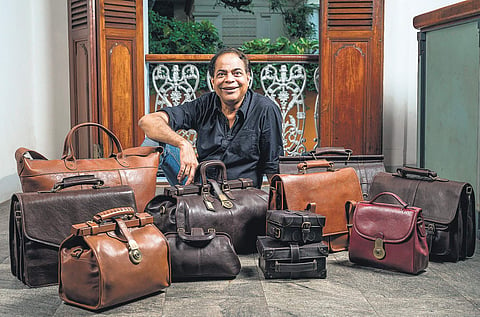

In the raw brick architecture factory designed by Ray Meeker, set among trees and duck ponds, over 400 people, mostly women, are at work. They hand-cut leather, stitch the pieces together and finish the handbags with brass buckles, also crafted at the factory. Set apart from the buzz of manufacturing is a quiet room known as the sample store. This is where all Hidesign bags originate. New styles are discussed, prototypes made and analysed and designs finalised. The brand’s president and founder, Dilip Kapur, leads this process, putting his signature on every new product—something he has done throughout the 40 years of Hidesign’s journey.
“Yes, I sit in on every new collection, every bag,” Kapur says. “There is a mistaken notion that design is about following trends. My belief is that design is intertwined with culture. My hands-on approach is necessary to keep intact that principle which is at the core of Hidesign. I cannot risk designers creating a bag that is an imitation.”
His involvement means huge demands on his time, for Kapur travels extensively, to his stores across the country and to the international markets where his bags sell. “I both hate and love travel,” he says. “Hate it, because I do so much of it and love it because I truly enjoy travel.”
In fact, it was his fascination with travelling that led him to make bags in the first place; they were inspired by the travel case. Kapur was working on his PhD in international affairs in the US when he went to work part-time in a leather factory. “I learned to cut, stitch and colour. And realised how much I enjoyed the sensory experience of working with leather,” he recalls. After completing his education, he returned to his hometown, Pondicherry, and decided to settle in Auroville. It was the late ’70s and he carried back with him the impact of the radical counter-culture sweeping the Western world at the time. “I wasn’t a hippie, I didn’t drop out. But I certainly subscribed to the rebelliousness of the era, which gravitated against the mainstream and materialism.”
In Auroville, Kapur needed something to do. Why not in leather, which he had mastered? In the US, he had constantly heard of a top quality leather known as EI. On probing, Kapur learned it stood for East India and that this superior leather was processed near his hometown, but it was a dying skill. Kapur went looking for tanneries that still used this traditional method and found a handful. He roped in a cobbler and started making bags from a tiny outlet in Auroville.
It was the international community there that brought his bags to the world’s attention. An embroidery-maker modelled one of his bags and Welthungerhilfe, the German organisation, placed an order for 1,000-plus bags. “I could barely manage 400 within the deadline and they stepped in graciously with funds,” Kapur says. Other Auroville friends introduced his pieces in Australia, Hidesign became a visible presence on San Francisco’s Castro Street, dedicated to alternative design and in London.
Even as the brand grew, Kapur says he continued to remain steadfast to the ways of the Ashram, where he had his early education. “My early learnings resurfaced—concern for the ecology, belief in harmony with nature and respect for working with one’s hands,” he says.
It was only after Hidesign made a splash in non-mainstream fashion circles internationally that the bags were introduced in India. “At the time, what was available were rip-offs of major brands,” he remembers. “Then, a quiet revolution took place, women were going out to work, they didn’t want to look like bimbos. Our bags were for these evolved women.”
Kapur says that while he had lived in the US for 15 years and was considerably Americanised, returning to India and working here helped him tap into his Indianness. “We are from Pondicherry and our brand reflects the values of the place. Hidesign is about the things that matter to us.”
As an expert in the business of handbags, he says the perfect bag must make the woman feel beautiful. “It should become a second skin to her, which is why our bags are all-natural, with no harmful chemicals.” Kapur is also completely against fast fashion. “I’m told some women buy 10 bags a year and I should address that market. But I would want a woman to buy a classic bag that ages well, just like her.”